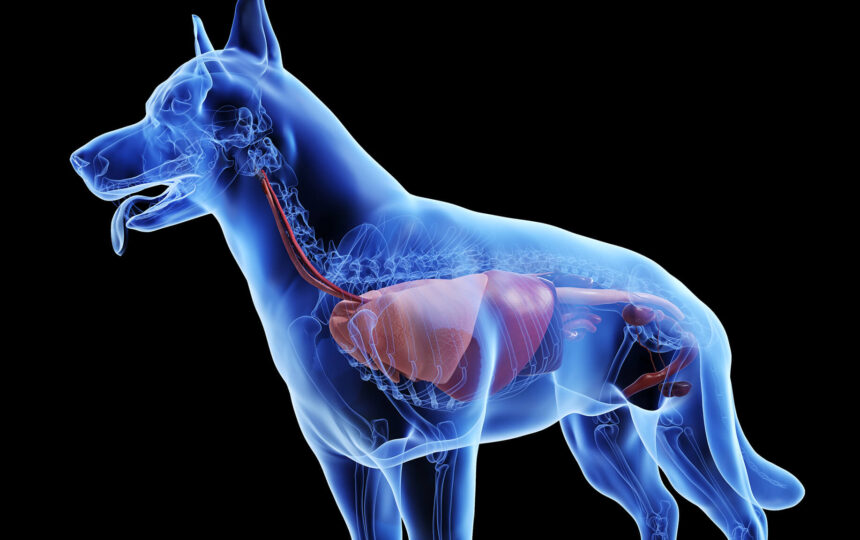As a dog owner, dealing with your furry friend’s stinky farts and occasional diarrhea might be a common occurrence. However, these symptoms can sometimes be more than just a minor inconvenience; they might indicate a serious gut issue that requires attention. In this article, we’ll delve into what these symptoms could mean and why it’s essential to take them seriously.
Bacterial Overgrowth in the Canine Gut
Bacterial overgrowth in the gut, specifically Small Intestinal Bacterial Overgrowth (SIBO), is a condition that can significantly impact a dog’s digestive health. It occurs when there’s an abnormal increase in the population of bacteria in the small intestine. This imbalance can lead to various digestive issues, including those stinky farts and bouts of diarrhea we’re concerned about.
The Causes of Bacterial Overgrowth
Bacterial overgrowth in dogs can be attributed to several factors:
Motility Disorders: Issues with gut motility, where the movement of the digestive system is slower or impaired, can lead to bacterial overgrowth. This is because the normal cleansing wave-like movements of the gut are reduced, allowing bacteria to proliferate.
Dietary Factors: Diets high in carbohydrates or diets that are not well-balanced can contribute to an overgrowth of bacteria. Certain types of bacteria thrive on specific nutrients, and an imbalance in diet can favor the growth of these bacteria.
Underlying Health Conditions: Conditions like chronic pancreatitis, liver disease, or intestinal lymphangiectasia can predispose a dog to bacterial overgrowth by altering the normal gut environment.
Use of Antibiotics: While antibiotics are essential for treating bacterial infections, inappropriate or prolonged use can disrupt the normal gut flora, leading to an overgrowth of harmful bacteria.
Symptoms of Bacterial Overgrowth
The signs of bacterial overgrowth can vary but typically include:
- Chronic diarrhea or loose stools
- Foul-smelling gas
- Bloating and abdominal discomfort
- Weight loss, despite a normal appetite
- Occasional vomiting
Diagnosis and Treatment
Diagnosing bacterial overgrowth involves a thorough examination by a veterinarian, who may recommend:
Fecal Tests: To check for the presence of abnormal bacteria and rule out parasites.
Blood Tests: These can assess overall health and check for conditions that might contribute to bacterial overgrowth.
Specialized Tests: In some cases, more specific tests like a bacterial culture or a hydrogen breath test might be necessary.
Treatment typically involves:
Antibiotics: To reduce the overgrowth of bacteria. The choice of antibiotic is crucial and should target the specific type of bacteria causing the problem.
Dietary Changes: Feeding a diet that’s easier to digest and less likely to promote bacterial growth. This might include a low-carbohydrate, high-protein diet, or a prescription veterinary diet.
Probiotics and Prebiotics: These supplements can help restore and maintain a healthy balance of gut flora.
Treating Underlying Causes: If an underlying disease is contributing to the bacterial overgrowth, managing that condition is crucial for long-term control.
Other Canine Gut Issues
When these symptoms are chronic or severe, they could point to an underlying gut issue. Some common conditions include:
1. Food Intolerances or Allergies
- Dogs can develop intolerances or allergies to certain ingredients in their food, leading to digestive upset.
- Common allergens include beef, dairy, wheat, egg, chicken, lamb, soy, pork, rabbit, and fish.
2. Inflammatory Bowel Disease (IBD)
- IBD in dogs is a group of disorders causing inflammation of the intestines.
- It’s a chronic condition that can lead to weight loss, vomiting, diarrhea, and gas.
3. Gastrointestinal Infections
- Bacterial, viral, or parasitic infections can disrupt the normal functioning of your dog’s digestive system.
- Infections like parvovirus, giardia, or salmonella are serious and require immediate veterinary care.
4. Pancreatic Issues
- The pancreas is crucial for digestion. Conditions like pancreatitis can impair its functioning, leading to digestive problems.
When to Seek Veterinary Care
It’s crucial to monitor your dog and seek veterinary care if:
- Symptoms are persistent or worsening.
- There’s blood in the stool.
- Your dog is showing signs of distress, lethargy, or appetite loss.
- You notice significant weight loss.
Diagnosis and Treatment
A veterinarian will likely:
- Conduct a physical examination.
- Request stool samples and blood tests.
- Possibly recommend dietary changes or prescribe medication.
- In severe cases, more in-depth diagnostic tools like ultrasound or endoscopy might be used.
Prevention and Management
To help prevent and manage gut issues in dogs:
Diet: Feed a balanced diet suited to your dog’s age, breed, and health status. Consider hypoallergenic or limited-ingredient diets for dogs with food sensitivities.
Regular Check-ups: Routine veterinary visits can help catch and address issues early.
Probiotics: These can support gut health and improve digestion.
Hydration: Ensure your dog has constant access to clean water.
Exploring the Role of Diet in Canine Gut Health
Understanding the Impact of Diet
The diet you provide to your dog plays a pivotal role in their gut health. Just like in humans, what dogs eat can greatly affect their digestive system, influencing everything from nutrient absorption to the balance of bacteria in their gut.
Choosing the Right Food
Quality Ingredients: Opt for dog food with high-quality ingredients. Avoid foods with fillers, artificial colors, and preservatives, which can irritate the gut.
Balanced Nutrition: Ensure the food meets your dog’s nutritional needs, which vary based on age, breed, and health status.
Food Trials: If food allergies or intolerances are suspected, your vet might recommend a food trial with a hypoallergenic or limited ingredient diet to identify the culprit.
The Role of Fiber
Digestive Health: Dietary fiber plays a key role in digestion. Soluble fiber helps with nutrient absorption, while insoluble fiber aids in bowel movement regularity.
The Right Amount: Too much or too little fiber can be problematic. Work with your vet to find the right balance for your dog’s specific needs.
Supplements for Gut Health
Probiotics: These beneficial bacteria can aid in maintaining a healthy gut flora.
Prebiotics: These are non-digestible fibers that feed the good bacteria in the gut.
Omega-3 Fatty Acids: Known for their anti-inflammatory properties, they can help with conditions like IBD.
Chronic Gut Issues and Long-term Management
For dogs with chronic conditions like IBD, long-term management might include:
- Dietary Management: Tailoring the diet to avoid irritants and include gut-friendly ingredients.
- Regular Vet Visits: Ongoing monitoring and adjustments in treatment as needed.
- Medication: In some cases, medications may be necessary to control symptoms.
The Importance of Early Intervention
Addressing gut issues early can prevent more serious complications. Regular vet visits and paying attention to changes in your dog’s digestion can be key.
Conclusion
In conclusion, while stinky farts and diarrhea can sometimes be laughed off as part of owning a dog, they can also be indicators of underlying gut issues that need attention. Understanding the role of diet, the impact of stress, and the importance of a healthy gut can make a significant difference in your dog’s quality of life. By working closely with your vet and paying careful attention to your dog’s dietary and health needs, you can help ensure that your canine companion enjoys a happy, healthy life with a well-functioning digestive system.






